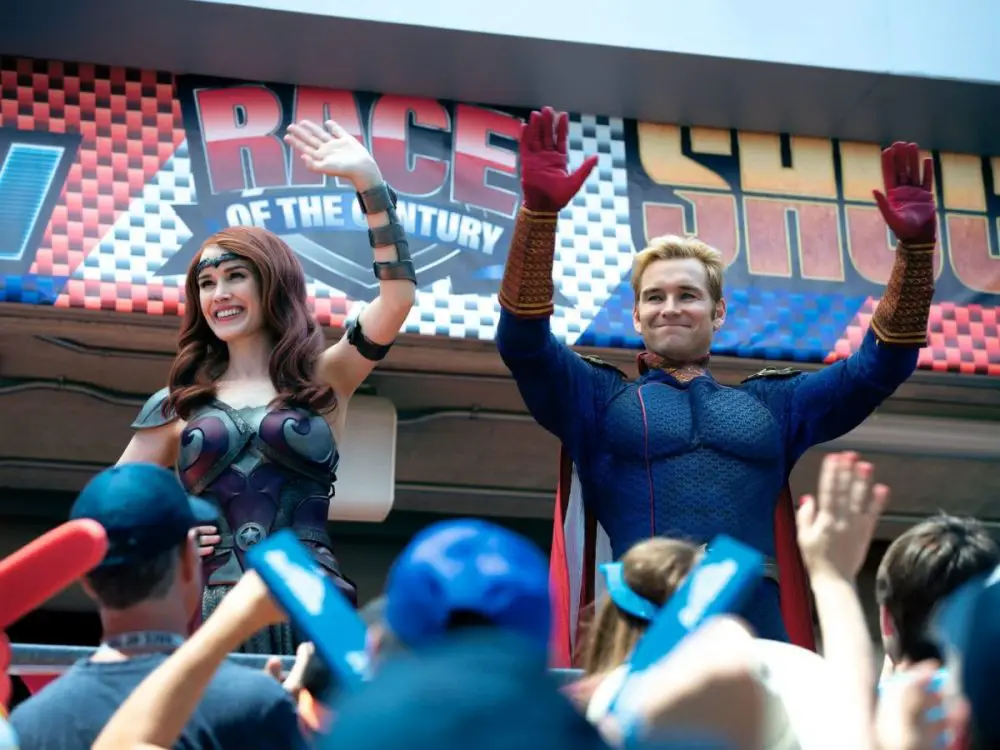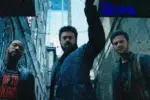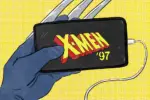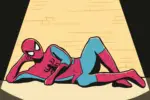With “Avengers: Endgame” ending the stories of many beloved characters within the Marvel Cinematic Universe, fans of the superhero genre are still longing for new installments. Given how Hollywood has begun to bleed Marvel and DC comics dry with on-screen adaptations, other comic book publishers are looking ripe for the picking. Amazon Prime’s new original series “The Boys,” adapted from Dynamite Entertainment’s comics, is the newest rendition that has turned the superhero genre on its head for the better.
The series begins in a world very similar to other superhero films, where people with supernatural abilities — referred to as “Supes” — are revered as celebrities and gods, standing vigilant to ensure the safety of civilians. Viewers of the show are quick to understand that looks can be deceiving when they discover just how little superheroes care about civilians’ actual well-being.
A small group of individuals, known simply as the Boys, who want to expose the criminal activities that these so-called heroes engage in are all that stand in the Supes’ way. It becomes clear in the first 10 minutes that the show isn’t like other superhero incarnations and is instead more akin to the dark tones ascribed to Zack Snyder’s films “Watchmen” and “Batman v. Superman: Dawn of Justice.”
To anyone looking for a combination between the dark tones of DC films and the comedic dialogue of Marvel films, here are the highs and lows of Amazon Prime’s “The Boys.”
Thrilling Action and Soundtrack
What makes “The Boys” such an enjoyable and invigorating show is its uncensored action and soundtrack that’s relevant to the scene’s tone. As gory and gruesome as some of the action scenes are, their spontaneity and swiftness add to the show’s overall dark humor, provoking laughter in the face of unspeakable horror.
Since the show deals with people who possess irregular powers, the strangeness of these abilities alone is enough to make someone chuckle as they defy our mundane conceptions.
The soundtrack aids in evoking both serious and comical tones of not only specific scenes or episodes but of the series as a whole. Catchy songs such as “Cherry Bomb” by The Runaways and “Wannabe” by the Spice Girls give the series punk rock and rebellious vibes that enhance action sequences and accompany critical character decisions.
A Great Revamp of the Darker Side of Superheroes
In other dark superhero movies, like Snyder’s films, superheroes are portrayed as morally ambiguous characters rather than as fully irredeemable. In “Batman v. Superman,” Ben Affleck’s Batman might be considered “dark” for violating the character’s rule against killing.
However, with Affleck’s Batman only using lethal force against the bad guys, Batman is still portrayed as a defender of the innocent. The same can’t be said of the superheroes seen in “The Boys,” who see the deaths of innocents as nothing more than occupational hazards.
https://www.instagram.com/p/B0rOnxuHvG-/
The term “superheroes” is questioned as being an appropriate title for individuals who are super in their abilities but are far from heroic in their actions. The main group of superheroes in the show, known as “The Seven,” commit many egregious acts that aren’t too dissimilar to what people in real life have recently done. “The Boys” demonstrates that even the influential and authoritative, who presume to use their power for good, are capable of using it for the worse.
The show offers a refreshing and nuanced outlook on how something that can appear familiar and safe can turn into something foreign and dangerous. This can apply to other topics outside the superhero lens, granting viewers the ability to recognize whether something is a facade or the truth in their own lives.
Fleshed Out Characters
Out of all the characters in the show, the majority of them are memorable well after the show ends, including notably the Boys themselves: Hughie (Jack Quaid), Butcher (Karl Urban), Frenchie (Tomer Capon) and Mother’s Milk (Laz Alonso). The ultimate factors that make the characters so memorable and likable are their actions and dialogue resulting from well-crafted characterization. “The Boys” takes its time to show the characters’ personalities and motivations, allowing their actions and thoughts to be, if not justifiable, at least plausible.
Even the superheroes, the good and the bad, are thoroughly fleshed out in terms of the reasons for their actions. Homelander (Antony Starr), the show’s analog for Superman, is arguably the most sinister member of “The Seven” who, in spite of his horrific deeds, has a tragic backstory and massive character flaws. These elements of his character act as a basis for his distasteful ways, charting out what might be in store for him in the future.
Not All Characters Have a Satisfying Conclusion
The biggest and only real flaw of “The Boys” comes during the final minutes of the series’ total eight hours, where only one of the three main protagonists is given a proper ending. Butcher, the leader of the boys, closes Season 1 with a great cliffhanger that can’t make the second season come any sooner.
The other two main protagonists, however, Hughie and Starlight (Erin Moriarty), are last seen in the middle of performing CPR on a supe called A-Train (Jessie Usher) and aren’t seen again. It’s as if the editors forgot to include their last scenes in the final cut, with viewers now having to wait another year to find out what should have been shown in the show’s final minutes.
Suitable Only to a Select Audience
“The Boys” not being appropriate for all audiences isn’t necessarily a flaw, but its R-rated content still hinders itself from reaching its fullest potential for obtaining viewers. However, it’s not to say all inappropriate content should’ve been cut, as some of it pertains to an audiences’ understanding of the show’s themes. Though cutting content that is not vital to comprehending the show’s messages, like nudity and swearing, would’ve been better suited for younger eyes.
Despite its limited age-range of viewers, “The Boys” is an effective satire on the superhero genre that makes it more than just a childish interest. Unlike the dark and gritty tones Synder employed in his films to merely garner visual and stylistic appeal, “The Boys” uses them to express issues associated with the current zeitgeist.
The show’s habit of not shying away from inappropriate or disturbing content is meant to force viewers out of their comfort zone to get a taste of other people’s perspectives. The show’s content also forces audiences to fathom certain circumstances others have had to endure, regardless of whether they can relate to the circumstances or not.
















